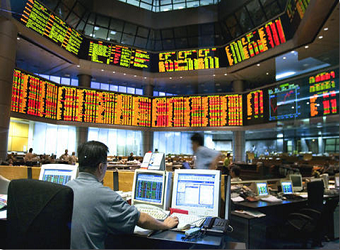Asia markets were mostly lower amid rising doubts over U.S. President Donald Trump’s ability to pass legislative reforms after Republican leaders pulled a bill to overhaul the U.S. health care system.
“The risk that markets are confronted with is one of Trump’s deal-making claims succumbing to policy paralysis on Capitol Hill,” explained Vishnu Varathan, senior economist at Mizuho Bank, in a Monday note.
The dollar weakened from a high of 100.00 seen last Friday to around 99.295 against a basket of currencies, at a near two-month low. Spot gold, viewed as a safe-haven asset, was trading higher at $1,255.82 an ounce, at a one-month high.
Japanese benchmark Nikkei 225 dropped more than 1.38 percent, as risk-off sentiment prompted a rush to safe haven bids such as the yen.
Shares of Toshiba tumbled 3.27 percent after local media reports that Toshiba’s U.S. subsidiary Westinghouse may file bankruptcy on Tuesday and seek support from Korea Electric Power.
Australia’s ASX 200 fell 0.16 percent, weighed by its materials sub-index which fell 1.38 percent.
Australian miner South32 said Monday morning that it would buy back $500 million of its shares. Shares of the South32 sold off 1.84 percent.
BHP Billiton dropped 2.74 percent, after the Escondida copper mine strike in Chile left the Australian miner with a loss of about $1 billion and in a weaker negotiation position, Reuters reported.
In South Korea, the Kospi was off 0.46 percent after South Korean prosecutors said they will seek a detention warrant for ousted President Park Geun-hye, who has been accused of taking bribes from big businesses.
The Shanghai composite was up 0.14 percent and the Shenzhen composite was down 0.25 percent.
Hong Kong’s Hang Seng index was down 0.28 percent.
Chinese property developer Kaisa Group shares soared 62.82 percent, as the stock resumed trading on Monday after a two-year suspension.
On Sunday, a Beijing-backed civil servant Carrie Lam was chosen to be Hong Kong’s next chief executive, in what has been called a “small circle election.”
The majority of the special administration’s 7.3 million people did not have the chance to vote, as the leader was chosen among several candidates by a 1,194 person election committee.
Dow futures fell 111 points, S&P 500 futures were down 15.3 and Nasdaq futures were 39.5 points lower on Monday at 12:40 pm HK/SIN.
U.S. stocks had a choppy trading session last Friday, after media reports that the House pulled a key health care vote that was seen as crucial for President Donald Trump’s agenda.
The Dow Jones industrial average was down 0.29 percent to 20,596.72, the S&P 500 slipped 0.08 percent to close at 2,343.98 and the Nasdaq composite added 0.19 percent to 5,828.74.
The White House warned rebellious conservative lawmakers that they should support Trump’s agenda, or he may bypass them on future legislative fights, Reuters reported.
On the energy front, Brent crude futures slipped 0.27 percent to $47.84 a barrel while U.S. crude dipped 0.27 percent at $47.84.
A joint committee of ministers from OPEC and non-OPEC oil producers has agreed to review whether a global pact to limit supplies should be extended by six months, according to a statement on Sunday.
Against the greenback, the yen was weaker at 110.38, falling below the 111 levels seen last Friday, and the Australian dollar remained steady at $0.7625.
Investors are also focused on U.K. Prime Minister Theresa May’s plans to set out how her government plans to restore sovereignty over Britain’s laws in a speech scheduled for Thursday. The pound last traded at $1.2527 at 12:45 pm HK/SIN.
Source: CNBC


